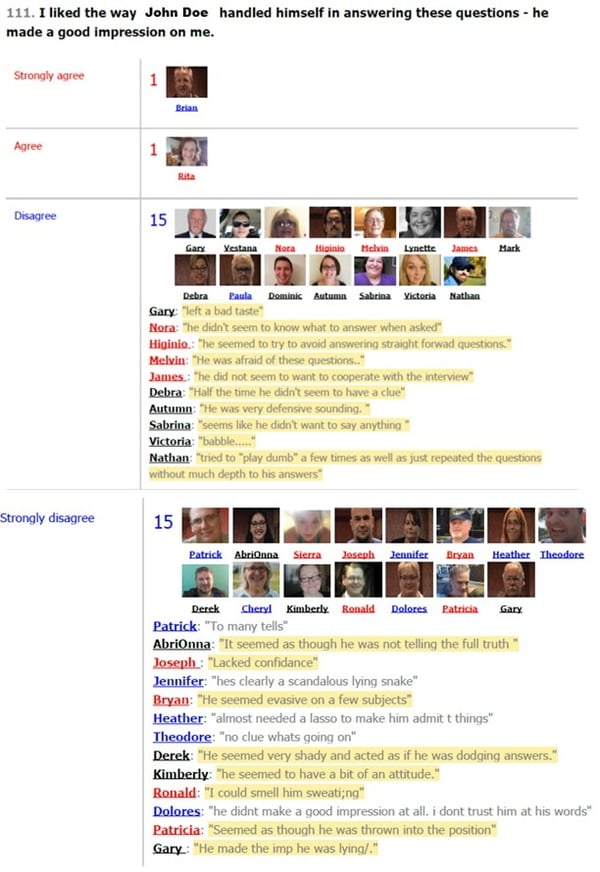
I imagine you have been in this situation: Your key witness is a good man. You know he is honest. In all your discussions he is down-to-earth. Likeable. Not a whiff of arrogance.
Then comes the deposition. And the video camera. And a hostile lawyer asking tough questions. What happens? Your likeable Joe Sixpack disappears... replaced by an arrogant jerk. Someone you have never seen before. It can happen to the best people. Before you know it, your star witness is earning feedback from jurors similar to these results from a recent Private Jury Trial:
"Tried to play dumb". "Lacked confidence". "I don't trust him". My clients told me that this witness was the nicest, most straightforward man I would ever meet, but he was a mess in his depo... and his poor showing turned the jury against them in a case they were winning before their own witness's testimony.
Many factors can cause this unwelcome transformation. The most common, of course, is fear. Specifically, fear of difficult questions. For defendants these difficult questions tend to come on liability; for plaintiffs they tend to come on damages.
This version of ugly can lock you and your client into foolish positions. It can be very costly. Here are some suggestions:
- Avoid untenable positions Most of the witnesses you call want to help the team. They want to say the right thing. And so in your informal discussions, they will agree to whatever position the team takes, even if they don’t actually agree with it. “No, we didn’t do anything wrong. We could easily have prevented this tragedy, but we didn’t do anything wrong.” Dumb themes and dumb positions make your witnesses look and feel dumb. Don’t ask them to defend the Indefensible. Don’t put them in a position where they inevitably will look stupid.
- Ask the hard questions You want to go way overboard, asking really tough questions of your witness as you prep. This builds confidence. The deposition will then feel like a relative cakewalk.
- Avoid hesitation Timing delays do not show up on a written transcript. Many lawyers therefore advise their witnesses to stop and think before answering every question. This is sensible, and works for the written transcript. But it produces extremely negative reactions on the video record. Encourage your witnesses to time their answers naturally. Not too fast. Not too slow.
- Explain hesitations If your witness must hesitate, they should ask for a moment to think, or explain why they are hesitating. If the question is complicated or unclear, this will be acceptable to many jurors - they secretly feel sorry for anyone facing questions from a hostile lawyer.
- Show them what they look like Take out your cell phone and make a quick video of your witness answering questions. Point out the good things, like smiling. And point out the things that could be improved.
- Show the hardheaded what mock jurors think of their testimony Finally, you can use an inexpensive service like First Court’s Prep4Dep to get feedback on your witness from disinterested lay people. This feedback typically comes in video form, so your witness can see and hear real people responding to the testimony. This is especially effective with witnesses who know everything or who do not want to take an upcoming deposition seriously.
Depositions and trials should help uncover the truth in our lawsuits. But the truth of a witness can be easily distorted by fear. The results can be disastrous. But anticipating the problem well ahead of the testimony, and considering the suggestions above, can help even the most nervous witness present more truthful testimony in your case, when it matters the most.
I hope you will give me a call at (701) 353-5315 or schedule a time if you want to discuss how to help your witnesses give their best testimony.
Recent Articles by Our First Court Team:
- Managing Your Greatest Asset: Time
- In Light of the Election: How Does Today’s Political Climate Affect the Jury?
- Exploring the Rewards of Mediation
- How Lawyers Can Start Building a Social Media Presence With Confidence
- Understanding Proximate Cause in Legal Defense
- A Trial Lawyer’s Guide to Serving Red Herring
- Two Things Can Be True Simultaneously: Learning to See Through the Eyes of a Juror
Tags:
ADR, Advocacy, Jury Research, Focus Group, Prep4Dep, Witness, Deposition, Testimony, Experts, Mediation, alternative dispute resolution, ArbitrationSep 17, 2018 12:04:27 PM







Comments